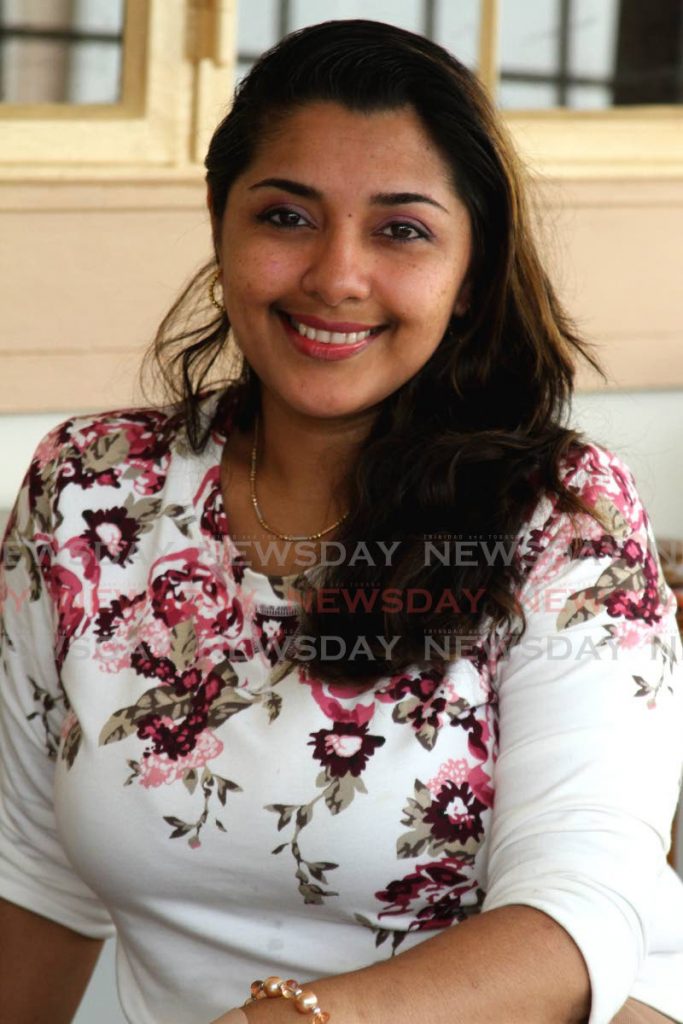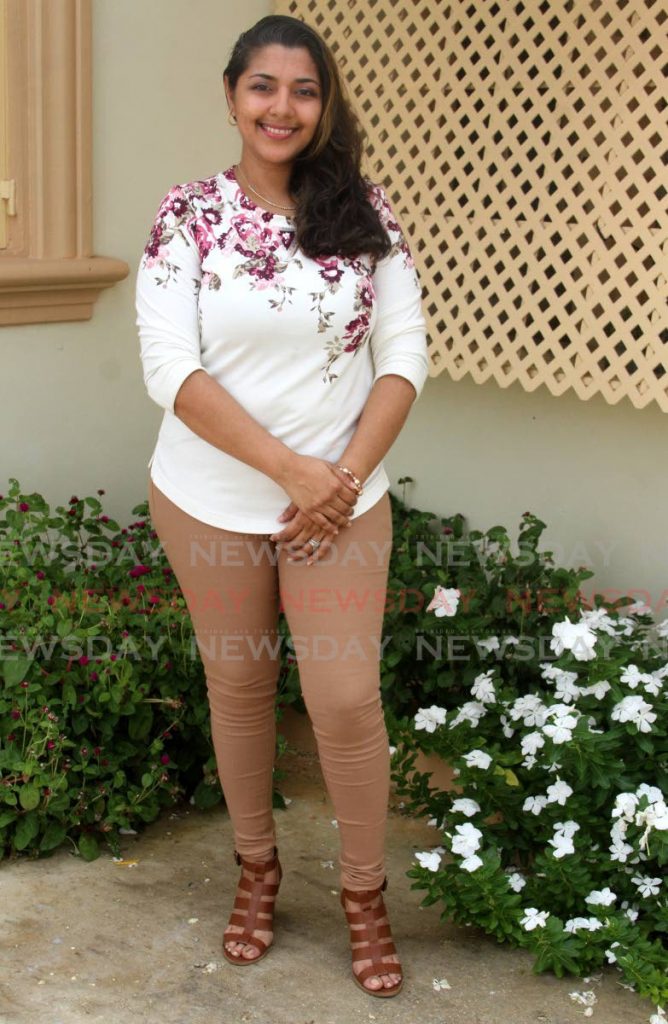Salina Peterson: An advocate for deaf rights

This interview was facilitated using the sign language interpretation services of Johannah-Rae Reyes. Currently a participant in the Deaf Empowerment and Advancement Foundation’s mentorship programme, Reyes has been learning and practising sign language since 2018.
In secondary school, Salina Peterson wanted to do technical drawing.
And she had the skills to do it.
An exceptional art student, Peterson did the Caribbean Examination Council (CXC) art exam in form three and passed with a grade two.
For Peterson, doing technical drawing would be the stepping stone to being an architect.
But there was just one problem.
Because Peterson is deaf, a schoolteacher told her it made no sense trying to become an architect.
Instead, the teacher told her to learn how to sew and cook.
The experience was crushing.
“I really wanted to do technical drawing. I wanted to design houses and fancy buildings, but my teacher did not allow me to do it.
“While I may have had the skills, she told me it was not a good choice for me.
“She asked how my future clients would communicate with me and said they would get frustrated because they can’t communicate with me,” said Peterson, 41, in an interview with WMN.
Realising that many deaf people, like herself, are often not given the chance to achieve their full potential, Peterson is now an advocate for deaf rights.
Her goals? To ensure that members of the deaf community are adequately accommodated in society and receive the resources needed to achieve upward social mobility.
In 2019, she was elected the first woman president of the Deaf Empowerment and Advancement Foundation (DEAF).
Established in 2011, the foundation raises funds to support projects such as buying digital devices for schools for the deaf and hosting spelling competitions for deaf students.
The foundation also has an emergency fund to help deaf people in need.
Peterson was born deaf. Growing up in Petit Bourg, her parents discovered she was deaf at the age of two.
“I was playing with the fishes in a fish tank. My father came home and jingled his keys, behind me, thinking I would turn around but I didn’t.”
Playfully trying to catch her attention, with her back turned, Peterson’s father continued shaking his keys.
“He touched my shoulder and I jumped because I had no idea he was there. I thought I was going to get licks for playing with the fishes, but he just hugged me.
“They took me for a hearing test and the doctors confirmed I was deaf.”
Her parents were worried about the effect on her quality of life. As a child, Peterson felt different and struggled with being deaf.
“When my brother was born, I was hoping he would be deaf like me, but he wasn’t. Again, I was the only deaf one in the family and I was angry for some time. My mother tried to explain to me that I was born deaf, but I was thinking it was something she gave me.”
At school, a teacher explained to Peterson that being deaf was not anyone’s fault; it was normal. Her parents also assured her it would be okay.
Peterson attended several different schools for the deaf. When she wrote the common entrance exam, she failed on her first attempt. On the second attempt, she passed for El Dorado Junior Secondary School (now El Dorado West Secondary). She was 13. Although she enjoyed learning, the lack of accommodation for her disability made it difficult to learn.
She and another student at the neighbouring senior comprehensive school (now El Dorado East Secondary) had to share one sign language interpreter.
“At one point in time, I was in form one and the other deaf student was in form four. The interpreter was mostly with the form four class. In my class, sometimes the teacher would be talking, and I couldn’t understand. I usually asked the students sitting next to me what was happening, but everyone was trying to focus.”

Because of this, Peterson fell behind in schoolwork for some time, but she persevered with help from her parents, and developed a particular affection for art.
Realising how happy art made her, she was sent to private art classes. But despite her dedication, that one teacher still discouraged her from doing technical drawing, seeing nothing more than her disability.
“She (the teacher) said I may have the skills, and be very good at drawing, but questioned how my future clients would communicate with me.
“She said they (my future clients) would get frustrated because they can’t communicate with me and choose someone they can talk to. She said because of that, my future business (in architecture) would fail.”
Disappointed, Peterson took the teacher's advice and learned to sew.
“I was very good at sewing. Other students would ask me for help and I happily showed them how to do it, in exchange for them helping me with written homework.”
She moved on to the senior comprehensive school, leaving at 19.
Her artistic talents did not go to waste, though. For some time, she worked as a designer for a jewellery shop.
“I worked on bridal pieces, earrings and different things. Then, I got married and I focussed on taking care of my family.”
Peterson and her husband, Alex, got married in 2008. By that time, she had several jobs including being a sign language interpreter for news and at government events. She stopped working after marriage to start a family. They have two children: ten-year-old Faith and nine-year-old Matt.
Alex is deaf while their children are not. The children have learned sign language.
Peterson told WMN, “My parents loved me very much and taught me life skills. My parents worked hard to make sure I got a good education and cherished me. Now that I have my own children, I do the same. I love them very much.”
She stopped working when she got married but as her children are now older, she has re-joined the workforce. In 2014, she became a sign language instructor with the Caribbean Sign Language Centre (CSLC). And, in 2019, she taught a sign language course at the Lloyd Best Institute of the Caribbean in Tunapuna.
She joined DEAF in 2015, but was hesitant when offered with the chance to be the foundation’s president, last year, at the foundation’s annual general meeting.
“I was not sure (about being president) because I have children to care for. But I eventually decided to accept the nominations."
At the top of her to-do list as president is continued advocacy for greater inclusion of deaf people in TT. And all the foundation’s members are on board to make it happen.
“At one time, we held a protest to get the government to recognise the Trinidad and Tobago sign language. We were hoping they would improve the situation.”
At the onset of the covid19 pandemic in March, the foundation started a Deaf News programme on Facebook after the foundation received complaints that deaf people were not being reliably informed about the pandemic.
The foundation also partnered with the Association for the Hearing Impaired (TTAHI) to distribute food hampers to deaf families in need during the initial covid19 lockdown.

“We also started a mentorship programme for hearing interpreters to work with deaf mentors. The deaf mentors would help the hearing interpreters improve their skills.”
The programme’s activities are now online due to covid19.
Peterson hoped that more people are willing to learn sign language. The CSLC, where she tutors, offers classes which are now online due to covid19. She also gives private online classes. Other deaf advocates that offer private tutoring include Ian Dhanoolal and Stephen Dookharan.
Peterson had some important advice for people who want to learn how to sign: “If you are learning sign language, it is important that you interact with deaf people. Learn the culture and how different people sign.”
Peterson hopes the government identifies TT sign language (TTSL) as a national language and establishes laws to protect the deaf from abuse.
“I also want (government) buildings to be safe and friendly for deaf people. The alarms (in these buildings) need to have lights so that deaf people can be properly alerted too if there is an emergency.
While there are schools for the deaf, Peterson hopes that the Ministry of Education works on properly catering for deaf students in public schools by ensuring there are enough interpreters in each school.
Peterson hopes that the potential of no deaf student, like herself, is ever limited because of their disability.
People interested in learning sign language, and more about the Deaf Advancement and Empowerment Foundation, can send an email to: deaforgtt@gmail.com or find the foundation on Facebook using the foundation’s name.

Comments
"Salina Peterson: An advocate for deaf rights"